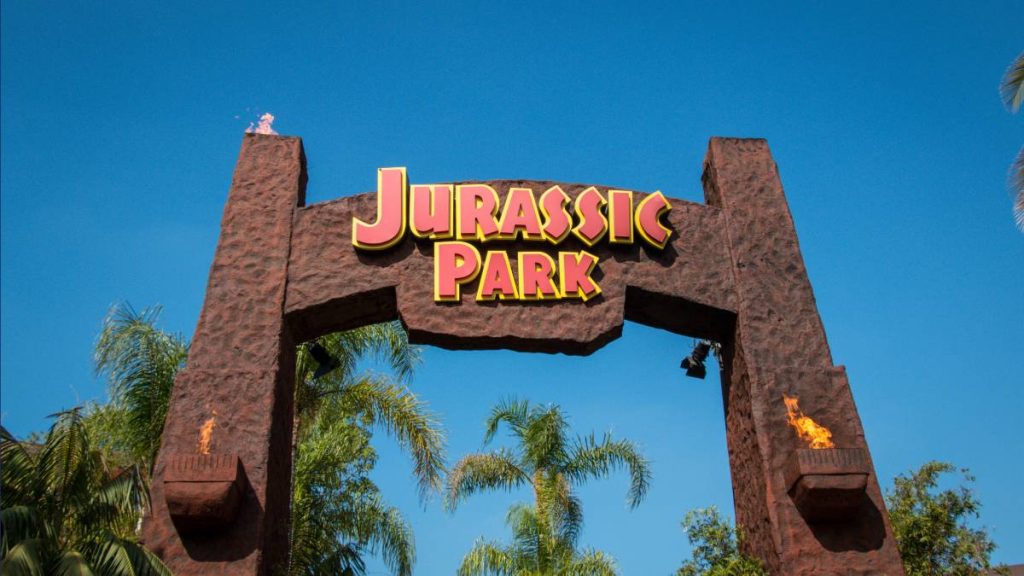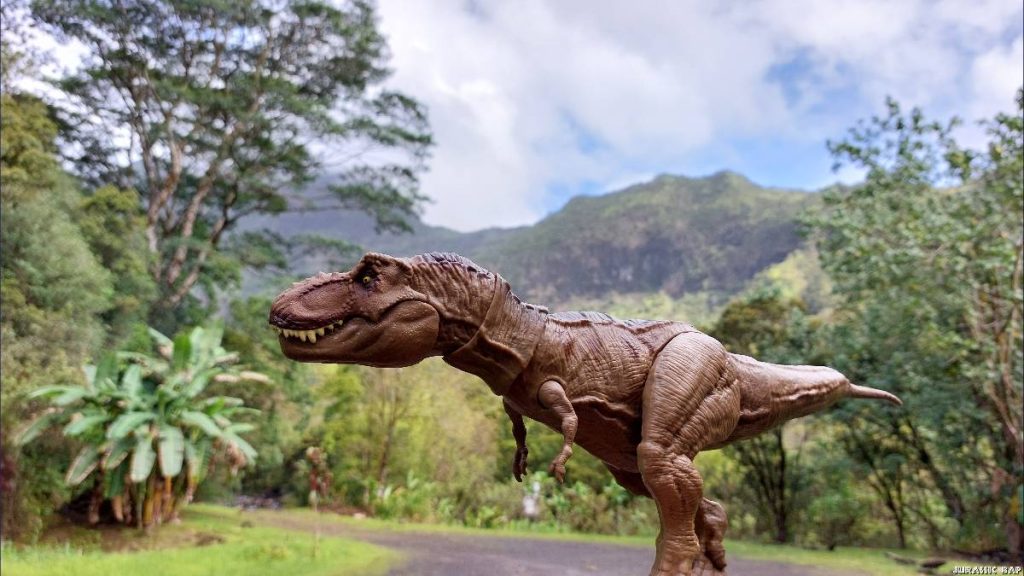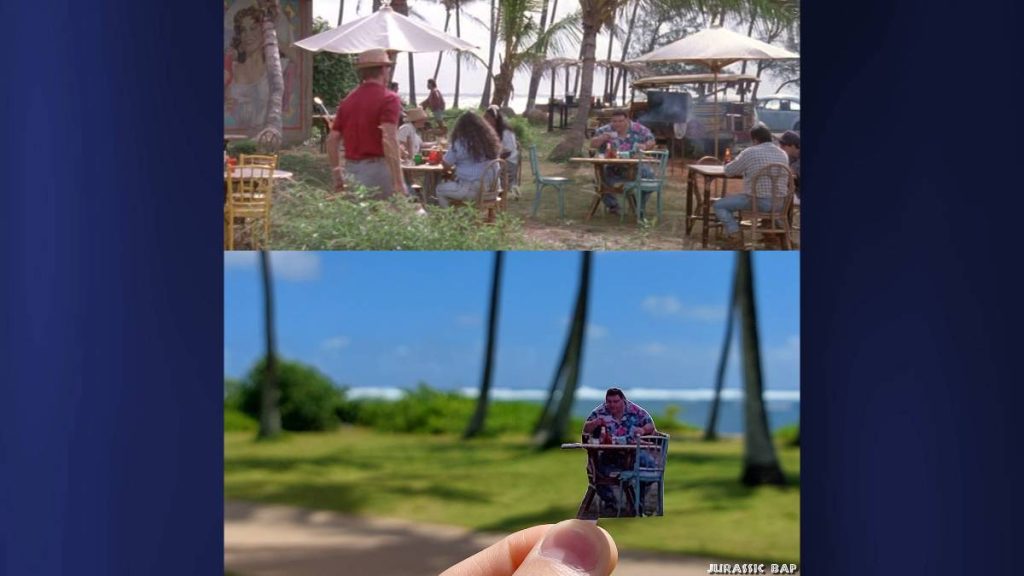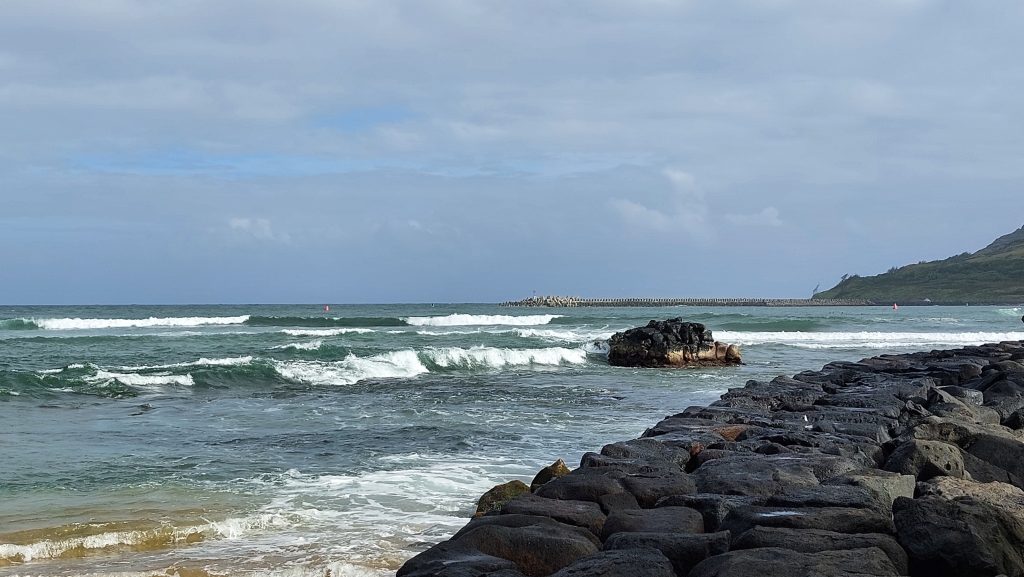‘Jurassic Park’ roared onto screens 30 years ago; Kaua‘i locals, tourists still get chills

Small children sometimes make fantastic observations.
So when a young girl frantically reported a dinosaur running loose on the island of Kaua‘i, her mother was doubtful.
Still, the girl persisted. She’d seen a dinosaur. It was gigantic, and it was outside her family’s Kapa‘a home.
“Mommy, Mommy, Mommy,” she began to cry. “There’s a dinosaur out there.”
Her mother finally rose and walked to the window. Perhaps her jaw dropped — because the massive head of a Tyrannosaurus Rex was indeed moving above the shrubbery.
But the T-Rex’s head, while terrifyingly lifelike, was not moving on two legs. It was decapitated and strapped to a flatbed pickup truck, making its way to a shooting location for a new Steven Spielberg movie: “Jurassic Park.”

The film, of course, garnered critical acclaim and commercial success upon its release in 1993. It also spawned five sequels, the last of which — “Jurassic World Dominion” — premiered in 2022.
For many, especially those who lived on Kaua‘i during the early 1990s, the first “Jurassic Park” remains supreme: A dazzling techno-thriller shot right in their backyards.
However, the making of “Jurassic Park” ended in tragedy. On Sept. 11, 1992, Hurricane Iniki plowed across Kaua‘i, causing $3.1 billion in damage and killing seven people throughout the state.
Still, 30 years after “Jurassic Park” first roared into movie theaters, Kaua‘i film professionals continue to remember the movie with love. And so do tourists, who flock to the Garden Isle to visit the locations of their favorite movie moments.
Setting the Scene
Angela Tillson and her colleagues were determined to bring “Jurassic Park” to Kaua‘i.
As volunteers for what would become the present-day Kaua‘i Film Commission, they scouted the island, taking photographs of locations they thought fit the filmmakers’ vision.
“You get a script and, as a location person, you break it down,” said Tillson, who still works in the local film industry. “Then all of us went out and took pictures of what we thought. I think they just sent us a synopsis of what they wanted — ‘jungle’ and ‘dinosaur land.'”
Their hard work paid off. Spielberg and company chose Kaua‘i to serve as not one but three major settings in the film: Costa Rica, the Dominican Republic and Isla Nublar, the fictional island home to genetically-engineered, man-eating dinosaurs.
Tillson found herself tapped to become an actor when the time came to shoot the Costa Rica scene in North Kapa‘a, near where Jimmy’s Grill stands today.
The scene stars Wayne Knight as the duplicitous computer programmer Dennis Nedry, sitting at a wind-blown café with a businessman intent on stealing from the Jurassic Park facility. The businessman famously hands Nedry a modified can of Barbasol shaving cream, which opens to reveal a dinosaur-embryo storage container.

Tillson can be seen sitting at a nearby table as the exchange occurs.
“I got chosen because I’m Latin and the movie [scene] is shot in Costa Rica,” Tillson said. “They picked up a lot of my friends for that café scene.”
But perhaps Tillson’s fondest memory of that day occurred just off camera, when she chatted with a friend of a friend.
“I’m standing there and I heard somebody say, ‘Are you Angela?'” she recalled. “It was Samuel L. Jackson.”
Tillson would go on to work on subsequent “Jurassic Park” films, including 1997’s “The Lost World: Jurassic Park.” She remembers driving the movie’s stars Jeff Goldblum and Vince Vaughn to set when the song “Macarena” came on the radio.
“Jeff says, ‘Oh, I don’t know how to dance that.’ I’m like, ‘Really? You want to learn? Come on, guys,'” Tillson said. “We were up on a hill and they’re doing the Macarena. It was such a blast.”
Surviving the Storm
Sue Kanoho wasn’t always the executive director of the Kauaʻi Visitors Bureau, a tourism body that handles “Jurassic Park” inquiries to this day.
“We’ve had people walk into our office and go, ‘I’m looking for this particular location’ or ‘I’d really love it if I could see this,'” she said.
In 1992, Kanoho was serving as executive director of the Kaua‘i Economic Development Board. As such, she was tasked with promoting industries other than tourism — and that included filmmaking.
Kanoho became an unwitting harbinger of doom on the set of “Jurassic Park.”
“I went on the movie set … and thanked Steven Spielberg for filming because it was at the end of the movie, and said not to worry about that hurricane [Iniki], because you’re going to be gone by the time it hits,” Kanoho said. “I remember him looking at me like, ‘What are you talking about?’ I didn’t find out until a year later that nobody had told him about the hurricane coming.”
Kanoho later weathered the storm with the movie’s cast and crew in the Westin Hotel in Nawiliwili, now a Marriott.

“I woke up in the morning after the hurricane, I looked up and there was Jeff Goldblum and Laura Dern,” she said.
Goldblum, Dern and approximately 160 other cast and crew members were later rescued by commercial air pilot Fred Sorenson, a man with his own ties to filmmaking.
More than 10 years earlier, Sorenson fell into the role of biplane pilot Jock in the opening sequence of “Indiana Jones and the Raiders of the Lost Ark” — another Spielberg film shot on Kaua‘i.
Sorenson’s was the first plane to land on the Garden Isle following Hurricane Iniki.
“There was a lady over by the fence, waving her arms, asking, ‘Hey, can you guys help us?'” Sorenson recalled. “I said, ‘Well, aren’t you Kathleen Kennedy? … Your husband, Frank Marshall, hired me to do ‘Raiders of the Lost Ark.'”
Sorenson and Kennedy — who is now president of Lucasfilm — soon arranged for Sorenson to return with a larger plane. As he taxied down the runway, he couldn’t resist a little Hollywood humor. He began to sing the opening notes of Indiana Jones’ “Raiders March” theme.
“Everybody was exhausted. Everybody was tired. Everybody just wanted to get off the island,” Sorenson said. “So as we’re going down the runway, I picked up the microphone and I couldn’t resist it … they all just snapped, ‘Just get us out of here!'”
‘Jurassic Park’ Forever
Baptiste Coudert spent five years building a vacation fund, before he traveled from France to the Hawaiian Islands in 2022.
Coudert’s trip was not an average one. For Coudert — who goes by “jurassic_bap” on Instagram — it was a pilgrimage to the places where his favorite film was shot.
“When I saw the film for the first time it was in 1994, on VHS, and I was 3 years old,” Coudert said. “I already liked dinosaurs when I saw it, but what made it special happened gradually. It started with the landscapes — I had never seen a tropical island before and as you can imagine, it’s completely different from what we have in France.”
Coudert came to Kaua‘i armed with toys and cutouts to replicate his favorite scenes, which he later sent to Kanoho, becoming one of the latest to contact the tourism executive about “Jurassic Park.”
“After 30 years between shooting and my visit, I can say the places were instantly recognizable and I could literally picture the actors, vehicles and animatronics at every spot,” Coudert said. “It really got me emotional, to say the least. It was like achieving a long-awaited dream, a dream that I wish with all my heart to live again in the next few years.”
Even Kaua‘i County Film Commissioner Sandy Kaauwai is an unabashed fan of “Jurassic Park.”
“It’s one of the best movies ever made,” she said. “It’s a movie that’s going to be popular forever.”



